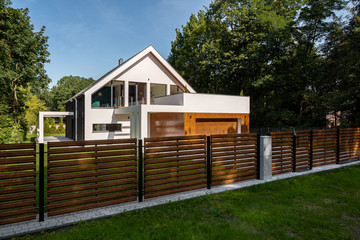Residential fencing is an investment that will increase the value of your property. It adds curb appeal, privacy to your home, and a sense of security. Wood fences are a classic choice that offers privacy and security. They also add a decorative accent to your home. Depending on your needs, budget, and homeowner association restrictions, you can choose various materials and styles.
 Residential fences are important because they define the boundaries of your property. They are a great way to protect your property and your family.Fence Company protects your property from unwanted visitors and can help prevent trespassing. They can also provide added privacy to your property and help you plan additions and renovations accordingly.
Residential fences are important because they define the boundaries of your property. They are a great way to protect your property and your family.Fence Company protects your property from unwanted visitors and can help prevent trespassing. They can also provide added privacy to your property and help you plan additions and renovations accordingly.
Several styles and types of residential fencing include wood, aluminum, and vinyl. Each type is durable but needs regular care to keep its appearance. If properly maintained, metal and wood fences can last for years. Choose a material that will withstand the weather conditions of your area. For instance, if you live in a humid climate, you may want to opt for wood or vinyl fences.
Before installing a fence, it is important to determine if your area has underground utility lines. You can contact 811 to determine where these lines are located. Also, you need to know if your property lines are defined. If you are not sure, you may need to have a professional survey of your property.
Besides providing security, residential fencing also adds elegance to your property. Whether you have small children or are a single parent, a fence will keep people from breaking into your home. This is particularly important if you live in an area with a lot of wildlife. Even wild animals won’t enter your property if you have a fence.
Decorative metal fencing is also a great option to add privacy to your property. The wrought iron fence is a traditional favorite, but decorative aluminum fences can give you the same look without rust or maintenance. Chain-link fences are also popular and are made from galvanized steel or coated PVC.
Residential fencing is an investment that increases the value of your property. It also provides privacy, protects pets, and keeps children from wandering off your property. Fences also protect your home from unsupervised dips in swimming pools. Ultimately, residential fencing creates a stunning aesthetic statement that enhances your property. And, depending on your budget, it can increase the value of your home. When choosing residential fencing, make sure to consult local municipal codes.
Depending on your needs, residential wood fencing can be a great way to mark property lines and keep unwanted people out. These fences are durable and can last for generations. You can even cut them down to fit your area, if necessary. Aluminum fences are another great option. Aluminum fences are lighter and cheaper than steel, and they can be installed easily, as well.
The first step in installing a fence is determining where the boundary line is. It would be best if you also discussed your plans with your neighbors before installing the fence. You can also contact your local building inspector to ensure you comply with the rules. After obtaining a permit, you can proceed with the installation. Aside from building code regulations, homeowners associations may also have strict guidelines about fence installation. Generally, fences can only be installed up to the property line, but make sure you know where the property line is so you don’t cause any problems.
Depending on the area, this line may vary slightly. If your fence is going to be installed near a property line, there are specific rules about the height of the fence. Typically, you can’t install a fence within five feet of the property line. Additionally, your front yard must have a minimum of 40 feet of space between the property line and the curb.
Another important consideration is the size of your fence. If your fence is going to be over 10 feet in height, you must check the neighbor’s property lines to make sure it doesn’t block air or light. Then, you must make sure that you don’t damage their trees. If you do, your neighbor may file a lawsuit against you for triple the cost of the tree stumps! You can consult a lawyer if you’re unsure about these rules.